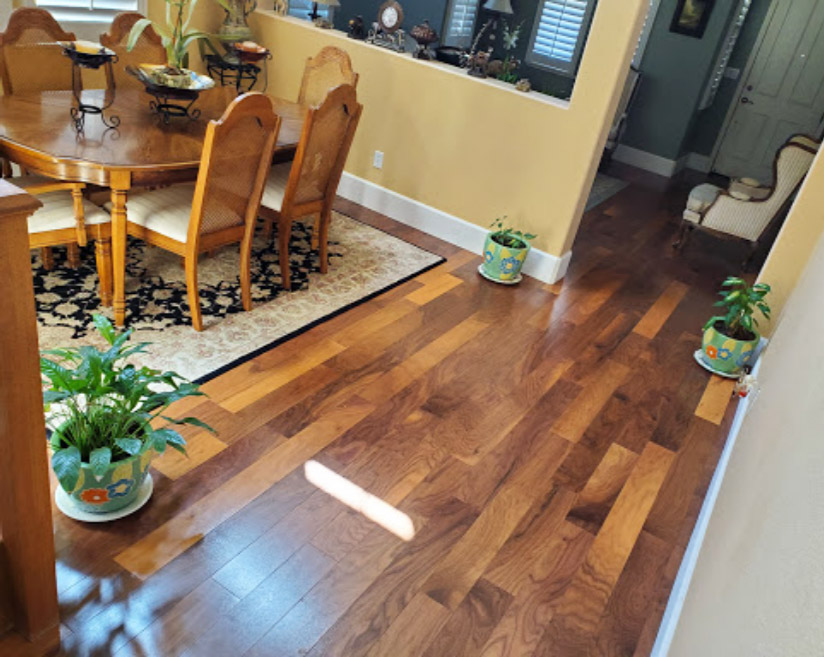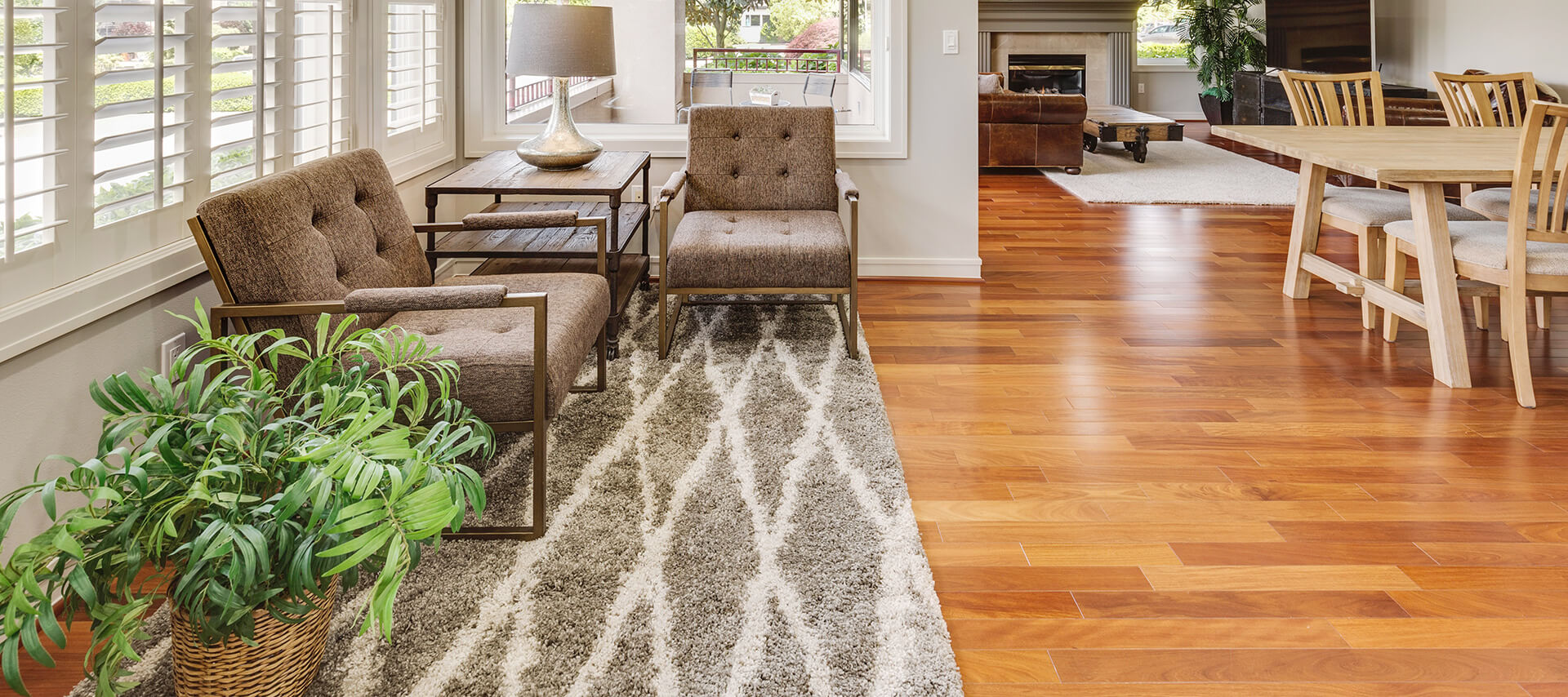Choosing the right flooring material for your home is of utmost importance.There are various options available, each with its own set of pros and cons.
Tile flooring offers a range of benefits such as durability, easy maintenance, and a wide variety of design options. However, it’s essential to consider factors like appearance, texture, and quality when making your choice. Understanding the pros and cons of each type will help you make an informed decision that suits your specific needs.
Whether you’re looking to add tile flooring to high-traffic areas or want to enhance the aesthetic appeal of a room, this article will offer valuable information to guide your decision-making process.

Table of Contents
ToggleOverview Of Tile Flooring Materials
Different Types Of Tile Materials
There are several different tile flooring materials available in the market. Each material has its own unique characteristics and appearance, making it important to understand the pros and cons of each before making a decision.
- Ceramic Tiles: Ceramic tiles are one of the most popular choices for flooring due to their durability and versatility. They come in a wide range of colors, patterns, and finishes, allowing you to create various looks for your space. Ceramic tiles are also resistant to stains and water, making them ideal for areas like kitchens and bathrooms.
Pros:
- Durable and long-lasting
- Easy to clean and maintain
- Wide range of design options
Cons:
- Can be cold underfoot
- Prone to cracking if heavy objects are dropped on them
- Porcelain Tiles: Porcelain tiles are similar to ceramic tiles but are made from denser clay fired at higher temperatures. This makes them even more durable than ceramic tiles. Porcelain tiles can mimic the look of natural stone or wood while providing excellent resistance against moisture, stains, and scratches.
Pros:
- Highly durable and scratch-resistant
- Water-resistant
- Available in various styles
Cons:
- More expensive than ceramic tiles
- Requires professional installation due to their weight
- Natural Stone Tiles: Natural stone tiles, such as marble, granite, travertine, and slate, offer a luxurious and timeless appeal to any space. These tiles are formed by nature over millions of years, giving them unique variations in color and pattern that cannot be replicated.
Pros:
- Adds elegance and sophistication to a room
- Highly durable
Cons:
- Expensive compared to other tile materials
- Requires regular sealing for maintenance
Advantages Of Tile Flooring
Tile flooring offers several advantages over other types of flooring materials. Let’s explore the benefits of choosing tile flooring for your home.
Durability And Long Lifespan
One major advantage of tile flooring is its durability and long lifespan. Ceramic tiles, stone tiles, and porcelain tiles are known for their ability to withstand heavy foot traffic and everyday wear and tear. They can handle the hustle and bustle of a busy household without showing signs of damage.
Easy Maintenance And Resistance To Stains, Water, And Scratches
Another benefit of tile flooring is its easy maintenance. Unlike some other flooring options, such as carpet or hardwood, tile floors are resistant to stains, water, and scratches. This makes them an excellent choice for areas prone to spills or moisture, like kitchens or bathrooms. Simply wipe up any spills or accidents, and your tile floor will look good as new.
Versatility In Design Options
Tile flooring offers a wide range of design options, allowing you to customize the look of your space. Whether you prefer a sleek modern aesthetic or a classic traditional style, there is a tile option that will suit your taste. Ceramic tiles come in various colors, patterns, and textures, giving you endless possibilities for creating unique designs in any room.
In addition to the design flexibility offered by ceramic tiles, stone tiles provide a natural beauty that adds warmth and elegance to any space. Porcelain tiles offer the look of natural materials like wood or marble but with added durability.
Disadvantages Of Tile Flooring
Coldness Underfoot, Especially During Winter Months
One of the downsides of tile flooring is that it can feel quite cold underfoot, especially during those chilly winter months. Unlike carpet or hardwood floors, tiles don’t retain heat very well. So, when you step on them with bare feet, it can give you a bit of a shock! You might need to wear slippers or socks to keep your feet warm and cozy.
Hardness That May Cause Discomfort Or Fatigue When Standing For Long Periods
Tile flooring is known for its durability and toughness, but this hardness can also be a disadvantage. If you have to stand for long periods in one spot, such as in the kitchen while cooking or doing dishes, the hard surface can cause discomfort and fatigue in your legs and feet. It’s like standing on a solid rock instead of something soft and cushiony!
Installation Process Can Be Time-Consuming And Costly
Another drawback of tile flooring is the installation process. Unlike some other types of flooring that are relatively easy to install, tile requires more time and effort. First, there’s the preparation work like leveling the subfloor and ensuring it’s clean and dry. Then comes the actual laying down of each individual tile piece, which needs precision and careful attention to detail. This process can take longer than expected and may require professional help if you’re not experienced with tiling.
Moreover, installing tile flooring can be costly too. In addition to purchasing the tiles themselves, you’ll need adhesive materials like thinset mortar or grout along with tools such as trowels and spacers. Hiring professionals for installation adds an extra expense as well.
While these disadvantages should be considered before choosing tile flooring for your home, it’s important to remember that every type of flooring has its pros and cons.
Wood Flooring Pros And Cons
Wood flooring is a popular choice for many homeowners due to its natural beauty and warmth that can add value to any space. However, it’s important to consider the pros and cons before making a decision.
Natural Beauty And Warmth
One of the major advantages of wood flooring is its natural beauty. The rich colors, unique grain patterns, and warm tones can instantly enhance the aesthetic appeal of any room. Whether you choose solid wood flooring or wood veneer, the authentic look of real wood creates a timeless and elegant atmosphere.
Susceptibility To Moisture Damage
While wood flooring offers many benefits, it does have some drawbacks. One significant disadvantage is its susceptibility to moisture damage if not properly maintained. Wood is a porous material, which means it can absorb moisture from spills or high humidity levels. This can lead to warping, cupping, or even mold growth if not addressed promptly.
To mitigate this risk, it’s essential to take preventive measures such as using mats near entryways to trap dirt and moisture, wiping up spills immediately, and maintaining proper humidity levels in your home. Regular cleaning with appropriate products designed for wood floors will also help preserve their longevity.
Higher Cost Compared To Other Flooring Materials
Another consideration when choosing wood flooring is its higher cost compared to other materials like tile or laminate. Solid wood flooring tends to be more expensive upfront due to the quality of the material and installation requirements. Exotic hardwood species can significantly increase the price.
However, it’s crucial to remember that investing in high-quality wood floors can pay off in the long run. Not only do they add value to your home but they also tend to have a longer lifespan compared to other types of flooring materials.
Hardwood Flooring Pros And Cons
Classic Elegance That Never Goes Out Of Style
Hardwood flooring is known for its timeless beauty and classic elegance. It adds a touch of sophistication to any room, whether it’s a cozy living space or a grand dining area. The natural grains and warm tones of hardwood floors can complement various interior design styles, from rustic to modern.
Pros:
- Timeless beauty and elegance
- Versatile, fits different design styles
Cons:
- Prone to scratches and dents over time
- Requires regular refinishing for optimal appearance
While hardwood floors offer undeniable aesthetic appeal, they do come with some drawbacks. Over time, the surface of hardwood flooring can develop scratches and dents from everyday wear and tear. This is especially true in high-traffic areas or homes with pets or children. However, it’s worth noting that these imperfections can also add character to the floor, giving it a lived-in charm.
Regular Refinishing For Optimal Appearance
To maintain the optimal appearance of hardwood floors, regular refinishing is necessary. Refinishing involves sanding down the top layer of the wood to remove any surface imperfections such as scratches or stains. After sanding, a fresh coat of stain or finish is applied to restore the floor’s luster and protect it from further damage.
Pros:
- Restores the floor’s original beauty
- Provides protection against future wear
Cons:
- Can be time-consuming and costly
- Disruptive during the refinishing process
The refinishing process requires time, effort, and often professional expertise. It involves moving furniture out of the room, sanding down the entire floor surface (which may take several days), applying finishes or stains, and allowing sufficient drying time before moving furniture back in.
Engineered Wood Flooring Pros And Cons
Engineered wood flooring is a popular choice for homeowners looking for an affordable alternative to solid hardwood floors. It offers several benefits, but it also has some drawbacks to consider. Let’s take a closer look at the pros and cons of engineered wood flooring.
More Affordable Alternative To Solid Hardwood Floors
One of the major advantages of engineered wood flooring is its affordability compared to solid hardwood floors. Engineered wood consists of multiple layers, with a thin veneer of real wood on top. This construction allows for cost savings without compromising on the appearance or durability of the floor.
Pros:
- Cost-effective option for those on a budget
- Provides the aesthetic appeal of real wood without the high price tag
- Available in a wide range of styles, colors, and finishes
Cons:
- Thinner top layer limits refinishing opportunities
- May not last as long as solid hardwood floors
- Quality can vary depending on the brand and manufacturing process
Limited Number Of Refinishing Opportunities Due To Thinner Top Layer
Unlike solid hardwood floors that can be sanded down and refinished multiple times, engineered wood flooring has a thin top layer that limits refinishing opportunities. The thickness of this layer varies from product to product, but generally ranges from 0.6mm to 6mm.
Pros:
- Can be sanded and refinished at least once or twice if necessary
- Allows for minor repairs and removal of surface scratches
- Offers more flexibility in terms of changing the appearance with new finishes
Cons:
Carpet Flooring Pros And Cons
Carpet flooring can be a cozy and comfortable option for your home. However, it also comes with its own set of pros and cons that you need to consider before making a decision.
Soft Texture Provides Comfort Underfoot
One of the major advantages of carpet flooring is its soft texture, which provides a comfortable surface to walk on. Unlike hard flooring materials like tile or hardwood, carpets are gentle on your feet and can make your home feel warm and inviting.
- Pro: The softness of carpet can be particularly beneficial in areas where you spend a lot of time standing or walking, such as bedrooms or living rooms.
- Pro: It can provide insulation, keeping your space warmer during colder months.
- Pro: Carpet also acts as a sound barrier, reducing noise levels between floors.
Requires Regular Vacuuming And Professional Cleaning
Carpet requires regular maintenance to keep it clean and looking good. Here are some important points to consider:
- Con: Carpets tend to trap dirt, dust, and allergens like dust mites. Regular vacuuming is necessary to prevent these particles from accumulating.
- Con: Stains can be more challenging to remove from carpets compared to hard flooring surfaces. It’s important to address spills promptly.
- Pro: Professional cleaning services are available for deep cleaning carpets periodically.
Can Trap Allergens Such As Dust Mites
While carpet offers comfort underfoot, it can also harbor allergens that may affect individuals with allergies or respiratory issues.
- Con: Dust mites thrive in carpet fibers due to their ability to trap dust particles. This can exacerbate allergies for sensitive individuals.
- Con: Pet dander can also get trapped in carpets if you have furry friends at home.
To mitigate these concerns:
- Pro: Regular vacuuming with HEPA filters helps reduce allergen levels in the carpet.
Laminate Flooring Pros And Cons
Laminate flooring is a popular choice for many homeowners due to its durability, affordability, and wide range of design options. However, like any other flooring material, it has its pros and cons that should be considered before making a decision.
Resistant To Scratches, Fading, Staining, And Moisture Damage
One of the biggest advantages of laminate flooring is its resistance to scratches, fading, staining, and moisture damage. This makes it an excellent choice for high-traffic areas such as hallways or living rooms where spills and accidents are more likely to occur. The protective layer on top of the laminate prevents scratches from pets’ claws or furniture being moved around. It is less prone to fading when exposed to sunlight compared to other flooring materials.
Pros:
- Resistant to scratches
- Resistant to fading
- Resistant to staining
- Resistant to moisture damage
Cons:
- Not suitable for areas with excessive moisture (e.g., bathrooms)
- Cannot be refinished like hardwood floors
Affordable Option With A Wide Range Of Designs Available
Laminate flooring offers an affordable alternative to hardwood or tile floors while still providing a stylish look. It comes in various designs that mimic the appearance of natural materials such as wood or stone. Whether you prefer the rustic charm of oak or the sleekness of marble, there’s a laminate design that can suit your taste and complement your home’s decor.
Pros:
- Affordable option compared to hardwood or tile floors
- Wide range of design options available
Cons:
- Not as visually authentic as real wood or stone
- Limited lifespan compared to higher-end flooring materials
When it comes down to choosing the right type of flooring for your home, considering the pros and cons is crucial in making an informed decision.
Vinyl Flooring Pros And Cons
Vinyl flooring is a popular choice for many homeowners due to its durability and resistance to water and stains. Let’s take a closer look at the pros and cons of vinyl flooring.
Highly Durable And Resistant To Water And Stains
One of the biggest advantages of vinyl flooring is its exceptional durability. It can withstand heavy foot traffic, making it an excellent option for high-traffic areas like hallways, kitchens, and entryways. Vinyl flooring is also highly resistant to water and stains, making it suitable for bathrooms, laundry rooms, and other moisture-prone areas.
Pros:
- Vinyl flooring is incredibly durable, making it ideal for busy households.
- It is resistant to water and stains, ensuring easy maintenance.
- Suitable for high-traffic areas due to its ability to withstand wear and tear.
Cons:
- Vinyl flooring may emit volatile organic compounds (VOCs) during installation.
- Some people may be sensitive or allergic to these VOCs.
- It is important to ensure proper ventilation during the installation process.
Wide Variety Of Styles, Including Options That Mimic Natural Materials
Another advantage of vinyl flooring is the wide range of styles available. Whether you prefer a modern look or want something that mimics the appearance of natural materials like hardwood or stone, there are numerous options to choose from. Vinyl planks can replicate the texture and grain patterns of wood while vinyl tiles can imitate the look of ceramic or porcelain tiles.
Pros:
- Vinyl flooring offers a vast array of design choices.
- You can find vinyl options that resemble natural materials at a fraction of the cost.
- The versatility in style ensures you can find something that suits your aesthetic preferences.
Cons:
- While vinyl flooring can mimic the appearance of natural materials, it may not provide the same level of authenticity as genuine hardwood or stone.
Cost Considerations For Different Types Of Flooring
Cost is a crucial factor to consider. Let’s explore the pros and cons of different tile flooring materials and how they affect your budget.
Factors Influencing The Cost Of Tile Flooring
Several factors can influence the overall cost of tile flooring. One significant factor is the quality of the material itself. Higher-quality tiles tend to be more expensive upfront but may offer better durability and longevity in the long run.
Another consideration is the complexity of installation. Certain types of tiles, such as ceramic or porcelain, require specialized tools and skills for proper installation. This can increase labor costs compared to simpler installation processes like those required for vinyl or laminate flooring.
Comparison Of Tile Flooring Costs With Other Popular Options
When comparing tile flooring costs with other popular options like carpet or hardwood, it’s essential to consider both upfront expenses and long-term maintenance.
Pros:
- Tile flooring offers excellent durability, making it a cost-effective choice in terms of longevity.
- It is highly resistant to stains, scratches, and moisture, reducing the need for frequent repairs or replacements.
- Tiles are easy to clean with regular sweeping and mopping, saving you money on cleaning products.
Cons:
- The initial cost can be higher than some other options like vinyl or carpet.
- Installation costs may also be higher due to specialized tools and skills required.
- In colder climates, tile floors can feel cold underfoot unless you invest in radiant heating systems.
Importance Of Budgeting For Upfront Expenses And Long-Term Maintenance
When planning your budget for tile flooring, it’s crucial to consider not only the initial expenses but also ongoing maintenance costs. While tiles are generally durable, they may still require occasional repairs if cracks or chips occur over time.
Design Options For Tile Flooring
Choosing the right design for your tile flooring can greatly enhance the overall aesthetic of your home. With various patterns, colors, sizes, and finishes available, you have plenty of options to explore. Let’s dive into the different design choices and how you can choose one that complements your home’s style.
Various Patterns, Colors, Sizes, And Finishes
You’ll find an array of options in terms of patterns, colors, sizes, and finishes. Whether you prefer a classic or contemporary look, there’s something for everyone. Here are some popular design options to consider:
- Patterns: From simple geometric shapes to intricate mosaics, patterns can add visual interest to your floors. You can opt for herringbone or chevron patterns for a modern touch or go for traditional designs like basketweave or subway tiles.
- Colors: Tiles come in a wide range of colors to suit any style preference. Neutral tones like beige and gray are versatile and timeless. Bold hues like blue or red can make a statement in a room. You can also mix and match different colored tiles to create unique patterns.
- Sizes: The size of tiles can impact the overall look of your space. Larger tiles can make a room appear more spacious while smaller tiles offer intricate detailing. Consider the size of your room and the desired effect when choosing tile sizes.
- Finishes: The finish on tiles adds texture and character to your floors. Glossy finishes reflect light and give a polished look while matte finishes provide a more subtle appearance. Textured finishes like brushed or tumbled add depth and visual interest.
Lifespan Of Different Types Of Flooring Materials
The lifespan of a flooring material is an important factor to consider when choosing the right option for your home. Each type of flooring has its own average lifespan expectancy, which can be influenced by various factors and maintenance practices. Let’s explore the pros and cons of different tile flooring materials in terms of their longevity.
Average Lifespan Expectancy For Each Type Of Flooring Material
- Ceramic Tile: Ceramic tile is known for its durability and can last anywhere from 20 to 50 years with proper care and maintenance. It is resistant to scratches, stains, and water damage, making it suitable for high-traffic areas like kitchens and bathrooms.
- Porcelain Tile: Porcelain tile is even more durable than ceramic tile and can have a lifespan of 50 years or more. It is highly resistant to moisture, stains, and wear, making it ideal for both indoor and outdoor applications.
- Natural Stone Tile: Natural stone tile, such as marble or granite, offers a timeless beauty that can last a lifetime if properly maintained. With regular sealing and cleaning, natural stone tile can withstand heavy foot traffic and retain its elegance for decades.
- Vinyl Tile: Vinyl tile is an affordable option that typically lasts between 10 to 20 years. While it may not have the same longevity as other materials, vinyl tile offers easy installation and maintenance, making it a popular choice for budget-conscious homeowners.
- Laminate Tile: Laminate tile flooring has an average lifespan of around 15 to 25 years. It provides the look of natural materials at a fraction of the cost but may show signs of wear over time in high-traffic areas.
Factors To Consider When Choosing Your Flooring Material
Lifestyle Considerations
Pets and children can have a big impact on the type of flooring material you choose. If you have active pets or rambunctious kids, you’ll want a flooring option that can withstand their energy and potential accidents. Here are some pros and cons to consider:
- Tile Flooring: Tile is durable and easy to clean, making it a great choice for households with pets or children. However, it can be hard and slippery, which may not be ideal for little ones who are prone to falls.
- Vinyl Flooring: Vinyl is also a durable option that can handle the wear and tear caused by pets and children. It’s softer underfoot than tile, providing more cushioning in case of falls. On the downside, vinyl may not be as resistant to scratches from pet claws as other materials.
- Laminate Flooring: Laminate is another popular choice for families with pets or children. It’s scratch-resistant and easy to clean. However, laminate can be slippery when wet, so caution should be taken to prevent accidents.
Environmental Impact And Sustainability Factors
If sustainability is important to you, there are several flooring options that are more environmentally friendly than others. Here are some considerations:
- Bamboo Flooring: Bamboo is a renewable resource that grows quickly, making it an eco-friendly choice. It’s also highly durable and resistant to moisture. However, some bamboo flooring products may contain adhesives or finishes that emit volatile organic compounds (VOCs), so it’s important to choose low-VOC options.
- Cork Flooring: Cork is harvested from the bark of cork oak trees without harming them, making it a sustainable choice. It has natural thermal insulation properties and provides cushioning underfoot. However, cork can be susceptible to moisture damage if not properly sealed.
Maintenance And Care Tips For Tile Flooring
Regular Sweeping Or Vacuuming To Remove Dirt And Debris
To keep your tile flooring looking its best, it’s important to regularly sweep or vacuum the surface. This will help remove any dirt, dust, or debris that can accumulate over time. By doing this simple maintenance task on a regular basis, you can prevent scratches and damage to the tiles.
Proper Cleaning Techniques Using Mild Detergents Or Recommended Products
Using the right techniques is crucial. You should avoid harsh chemicals that can potentially damage the tiles. Instead, opt for mild detergents or products specifically designed for tile cleaning. These will effectively remove stains and grime without causing any harm.
Periodic Resealing Or Regrouting To Maintain Tile Integrity
One of the advantages of tile flooring is its durability. However, over time, the grout between the tiles may become worn out or discolored. To maintain the integrity of your tile flooring, it’s recommended to periodically reseal or regrout the tiles. This will not only enhance their appearance but also protect them from water damage in wet areas such as bathrooms and kitchens.
There are several pros and cons to consider:
Pros:
- Tile flooring is generally low maintenance compared to other materials.
- Regular sweeping and occasional deep cleaning are usually sufficient.
- Tiles are resistant to stains and water damage when properly sealed.
- They are easy to clean with mild detergents.
Cons:
- Grout lines can be prone to staining if not properly maintained.
- Tiles may crack under heavy impact or pressure.
- The grouting process requires precision and expertise.
- Resealing or regrouting can be time-consuming.
Recommendation On The Best Type Of Tile Floor To Buy
There are several factors to consider. Different tile materials offer various benefits and drawbacks, so it’s essential to choose one that suits your specific requirements. Let’s explore the pros and cons of different tile flooring materials explained.
Factors To Consider When Selecting The Most Suitable Tile Flooring
- Durability: If you’re looking for a long-lasting option, ceramic and porcelain tiles are excellent choices. They are resistant to scratches, stains, and moisture, making them ideal for high-traffic areas like kitchens and bathrooms.
- Maintenance: Some tile materials require more maintenance than others. For instance, natural stone tiles like marble or granite may need regular sealing to protect against stains and damage. On the other hand, ceramic and porcelain tiles are relatively low-maintenance.
- Aesthetics: The appearance of your tile floor is an important consideration. Ceramic and porcelain tiles come in a wide range of colors, patterns, and finishes, allowing you to find a style that complements your home decor. Natural stone tiles offer unique textures and variations that can add character to any space.
- Cost: The cost of tile flooring varies depending on the material chosen. Ceramic tiles tend to be more affordable compared to natural stone options like marble or travertine.
Conclusion
In conclusion, we have explored the pros and cons of various tile flooring materials to help you make an informed decision for your home. By understanding the advantages and disadvantages of each type, you can choose a flooring material that best suits your needs and preferences.
From our analysis, it is evident that different types of tile flooring offer unique benefits. Wood flooring provides a timeless and elegant look, while laminate and vinyl offer durability and affordability. Hardwood flooring adds warmth and character to any space, while engineered wood combines the beauty of hardwood with enhanced stability. Carpet flooring offers comfort and insulation, making it ideal for bedrooms or living rooms.
When selecting your tile floor material, consider factors such as cost, design options, lifespan, maintenance requirements, and personal preferences. We encourage you to explore further details on each type of flooring material discussed in the previous sections to gain a comprehensive understanding.
Now armed with this knowledge about the pros and cons of different tile flooring materials, you are better equipped to make an informed decision when renovating or building your home. Remember to weigh the advantages against the disadvantages based on your specific needs and priorities. Whether you prioritize aesthetics or functionality, there is a tile flooring material out there that will meet your expectations. Happy tiling!
Sources:
/home-improvement/flooring/types-of-kitchen-flooring/
/home-improvement/flooring/how-to-lay-tile-flooring/
/home-improvement/flooring/clean-tile-grout/
/home-improvement/flooring/laminate-flooring-buying-guide/
Struggling To Find The Perfect Tile Flooring That Aligns With Your Unique Vision?
Nestled in the bustling heart of Concord, California, K Floors is your go-to solution for bringing that vision to life. We’re more than just a flooring company; we’re your partners in creating spaces that exude quality, reliability, and an unmatched selection. Whether you’re envisioning the classic elegance of marble tiles, the rustic charm of ceramic, or the modern appeal of porcelain, our range is as varied as your imagination.
The K Floors difference is unmistakable. Eliminate the guesswork in selecting the ideal tile flooring. Our team of seasoned experts is committed to assisting you at every turn. From complimentary in-home consultations, where we bring our expertise right to your doorstep, to our collaborations with leading vendors, we ensure that excellence isn’t just a claim—it’s our hallmark. Explore our extensive collection, featuring a variety of tile options including Ceramic, Porcelain, Mosaic, and more. Your perfect floor is not just a purchase; it’s a carefully made choice.
At K Floors, we’re dedicated to providing an experience, not just a sale. Based in Concord, California, we’ve skillfully merged traditional craftsmanship with modern styles, ensuring every tile we lay down transforms your space into a place that feels like home. Whether it’s a residential makeover or a commercial revamp, each project we embrace is a reflection of our dedication to quality and authenticity. So why wait? Step into K Floors, and let’s embark on the journey to your ideal tiled floor together.
Disclaimer
The materials available on this website are for informational and entertainment purposes only and not to provide legal advice. You should contact your attorney to obtain advice concerning any particular issue or problem. You should not act or refrain from acting based on any content included in this site without seeking legal or other professional advice. The information presented on this website may not reflect the most current flooring developments. No action should be taken in reliance on the information contained on this website and we disclaim all liability concerning actions taken or not taken based on any or all of the contents of this site to the fullest extent permitted by law.



